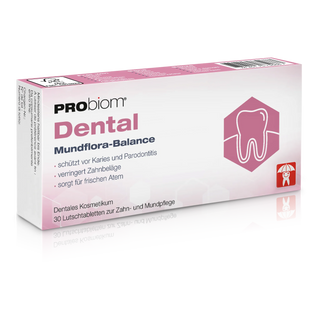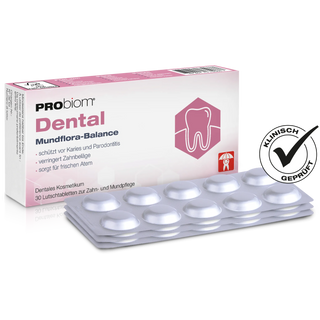Anyone who has ever suddenly felt anxious about bad breath in an important meeting, on a first date, or in a familiar conversation knows how stressful the issue can be. Bad breath and dry mouth are more than just minor blemishes—they significantly impact self-confidence, social relationships, and quality of life. Yet they are often taboo and rarely discussed openly.
This article comprehensively examines the causes, relationships, and treatment options for dry mouth and bad breath. The goal is not just to provide superficial tips, but to convey a deeper understanding of the mechanisms in the body and to suggest long-term solutions.
What does “dry mouth” mean?
A dry mouth occurs when the salivary glands produce too little saliva. Saliva performs numerous functions in the mouth: It moistens the mucous membranes, assists with chewing and swallowing, contains digestive enzymes, remineralizes the teeth, and protects against bacteria. If this protective layer is missing, a feeling of dryness, roughness, or burning occurs. Those affected also report difficulty speaking or swallowing.
Common causes of saliva deficiency
-
Medications : Over 400 active ingredients – including antidepressants, antihypertensives, antihistamines and painkillers – can inhibit saliva production.
-
Age : As we age, the amount of saliva naturally decreases, especially in people over 60.
-
Systemic diseases : Diseases such as diabetes mellitus , Sjögren's syndrome or Parkinson's often lead to chronic dry mouth.
-
Lifestyle factors : Smoking, excessive caffeine or alcohol consumption, and dehydration worsen symptoms.
-
Radiation : Salivary glands are often permanently damaged, especially in patients with cancer in the head and neck area.
Bad breath – more than just garlic breath
Bad breath occurs when volatile sulfur compounds (VSCs) are produced by bacteria on the tongue, between teeth, or in inflamed gums. The classic garlicky smell after a heavy meal is harmless and temporary. Chronic halitosis, on the other hand, indicates deeper problems.
Typical causes
-
Oral : tongue coating, periodontitis, caries, poor oral hygiene.
-
Extraoral : diseases of the stomach, liver, respiratory tract or metabolic disorders.
-
Xerostomia : Too little saliva prevents the natural cleaning of the mouth and almost inevitably leads to unpleasant odors.
Studies show that in approximately 80–90% of cases, the cause lies within the oral cavity itself. Only a small proportion is due to systemic diseases—nevertheless, this should not be underestimated.
The close connection between dry mouth and bad breath
The correlation between the two conditions is evident. Saliva acts like a natural "mouthwash": It rinses away food debris, neutralizes acids, and inhibits bacteria. When saliva is lacking, the odor-causing microorganisms multiply unhindered. Tongue coating, tartar, and inflammation increase. The result: persistent bad breath.
A study from Japan showed that patients with xerostomia are three times more likely to develop chronic bad breath. People who have multiple risk factors—such as medication use, age, and diabetes—are particularly at risk.
Psychosocial consequences
Bad breath and dry mouth aren't just medical problems. They have a profound psychological impact. Many sufferers develop a strong sense of shame, withdraw, or avoid social interactions. In some cases, this can even lead to what's known as halitophobia —the pathological fear of bad breath, even when objectively none is present. This psychological component should not be underestimated in treatment.
Diagnosis – how do you find the cause?
A thorough diagnosis is crucial for taking targeted measures. Dentists and ENT specialists use various procedures:
-
Medical history : Questions about medications, lifestyle, previous illnesses.
-
Saliva tests : Measurement of saliva quantity and quality.
-
Organoleptic tests : Direct odor assessment by specialized personnel.
-
Halimeter : measurement of volatile sulfur compounds.
-
Blood or urine tests : Exclusion of systemic diseases.
Therapy approaches
Lifestyle and self-help
-
Hydration : Drinking enough water is the basis.
-
Sugar-free chewing gum : stimulates saliva flow through chewing.
-
Avoid alcohol and nicotine : Both have a drying effect.
-
Nutrition : Fresh fruits and vegetables promote saliva production and mechanically clean the tongue.
Medical treatments
-
Saliva substitutes : Artificial saliva preparations in the form of sprays or gels.
-
Medication adjustment : Change or reduction of certain medications in consultation with the doctor.
-
Pilocarpine : A drug that stimulates saliva production, used in severe cases.
-
Treatment of underlying diseases : For example, blood sugar control in diabetes.
Dental measures
-
Professional teeth cleaning : Removes plaque and reduces bacteria.
-
Tongue cleaning : With a scraper or brush.
-
Treatment of periodontitis and caries : elimination of odor-producing sources of inflammation.
Prevention – better prevention than treatment
Regular oral hygiene with toothbrushing, flossing, and mouthwash is the most important protection. But prevention goes further: stress reduction, a healthy diet, adequate sleep, and regular medical checkups all contribute significantly to maintaining oral health and saliva production.
Research and future prospects
In recent years, the role of the oral microbiome has come into focus. Scientists are investigating how targeted modulation of the oral flora through probiotics or prebiotic nutrients can alleviate bad breath and xerostomia in the long term. The development of innovative biomarkers for early diagnosis is also well underway. The future of treatment could thus lie in individually tailored microbiome therapy .
Conclusion
Dry mouth and bad breath are two closely related symptoms that may seem trivial at first glance, but can actually have profound effects on health and quality of life. They arise from an interplay of saliva deficiency, bacterial processes, and systemic factors. A holistic approach—consisting of good oral hygiene, lifestyle adjustments, medical treatments, and psychological support—offers the best chance of solving the problem sustainably.
FAQ – Frequently Asked Questions
Is bad breath always a sign of poor oral hygiene?
No. While poor dental care is often a factor, illnesses, medications, and dry mouth also play a key role.
Can dry mouth go away?
If the cause is temporary (e.g., dehydration or short-term medication use), saliva production can recover. In chronic conditions, only relief is often possible.
Does chewing gum help against bad breath?
Yes, temporarily. Sugar-free chewing gum stimulates saliva flow and masks odors. However, it doesn't address the underlying cause in the long term.
Should I always see a dentist if I have bad breath?
Yes. Since in most cases the cause lies in the mouth, the dentist is the first point of contact. If no cause is found there, the patient will be referred to other specialists.
Are there home remedies for dry mouth?
Drinking water regularly, sucking on sugar-free candies, and chewing celery or carrots can help in the short term.
Can bad breath also come from the stomach?
In rare cases, yes, such as reflux or Helicobacter pylori infections. However, most causes lie in the mouth itself.
Is halitosis curable?
In many cases, yes—especially if the underlying causes are treated. In chronic diseases, at least a significant improvement is possible.












